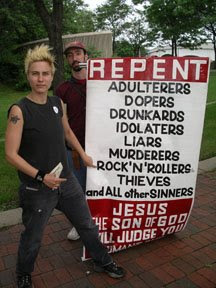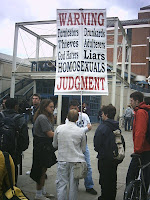Ho there friends.
As usual, the return from Germany is accompanied by a funky-schedule. Up early today (4-ish) which may mean a nap later. Anyhow, I thought I’d take the opportunity to use my time, & process some of my thoughts & observations from the trip.
In many ways Germany seems very familiar re: church culture… in Deutschland, the church culture is a few hundred years older than ours – & it is more obvious there (to me) that churches often take on the expected (but perhaps unspoken) role of “what churches do” & “don’t do”) – (e.g. meaning meeting on Sunday, in a “church” building, the calendaring of events, creation-or lack thereof, of specific programs). Much of what becomes normal seems to be based on what is “successful” – not necessarily a bad thing, but only as long as the definition of success matches Jesus’. Otherwise, success is the number of people at church. It is the lack of conflict. It is reputation. It is sticking to what others are doing – esp. when the other church is experiencing “success…” There’s a thought of “why re-invent the wheel? We’ll just follow what others are doing.”
This shows up in the adoption of models – (not Zoolander silly,) rather, meaning the copying (almost exactly) a particular church/organizations structure/plan – the state church, Hillsong, Willow Creek, Saddleback, Emergent, Church on the Way, etc. These models may “work,” but is it right?
So, I’m pondering conformity & normalization in the context of church, especially the local church – seeing this organization through the lens of another culture has spurred me to comtemplation mode… esp. from asking clarifying questions about things that I’d observed in the church structure – questions like:
-What is “normal” for the local church? What has made this “the norm?” (Think: traditions, identifying something as especially important/sacred, churchy-ness/religiousness etc…)
-What does it look like for the local church to be developing its own unque identity? esp. in the context of “conformity” – where outside pressures/influences (personal aspirations & agendas, denominational forms & norms, city/community ‘standards’, &/or expectations, to name a few) intentionally or not, exert force/pressure to shape the church into something it may/may not supposed to be becoming…
-Are there non-negotiables for every church (behaviors, norms, practices, methods, etc.)? If so, what are they? (beyond a statement of faith &/or an intellectual affirmation of values.) If not, why not?
-How do you determine the methods you will use to get from point A to point B with the people of your church?
More to come… your input is welcome. Probably.



